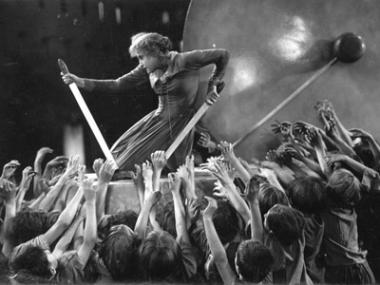Fritz Lang’s 1927 masterpiece Metropolis is a touchstone of cinema. This early sci-fi morality play, whose story of a divided mankind recalls the Morlocks and Eloi of H.G. Wells’ The Time Machine, has left its mark on a still-growing string of films—basically, any futuristic tale about people rising up against a shiny, technologically superior group of oppressors owes it a debt. As a look at any recent movie theater schedule might suggest, it’s been a pretty influential piece of work.
In it, the son of Metropolis’ most powerful man is awakened to the plight of the working class who toil underground to provide for the pampered ruling class on the surface. (Tellingly, it is the sight of a beautiful woman that leads to his epiphany. That template, apparently, was set early.) Haunted by his experience below ground, Freder confronts his father, only to find that the man he has long tried to emulate has no pity for the working class. Faced with his indifference, Freder is transformed into a revolutionary.
But if Metropolis is a classic, it remains something of a cultish one. Like Rashomon, the Twin Peaks series, or the films of Ingmar Bergman, I suspect that Metropolis has always been the kind of work whose supposed audience is made up more by people who think they have seen it than those who actually have, its iconic art design having so thoroughly seeped into our collective unconscious. (For many years, Northampton’s Pleasant Street Video featured an oversize poster for the film in their front window, furthering that impression for patrons waiting in line at the theater next door.)
But if you’re asking yourself whether or not you saw it, don’t bother. This week we all start over again, when Amherst Cinema brings in Metropolis: The Complete Restoration. This version, built from an essentially complete copy of the original film, is the result of Argentine film archivist Fernando Pena’s dogged search for a print long rumored to be cached away in the government film archives. Through a combination of perseverance and wild luck—after a decades-long search, he finally gained access to the archives only when his ex-wife became head of the Museo del Cine in 2008—Pena finally hit pay dirt, unearthing a print that an Argentine film distributor had carried back from Germany when the film premiered. The Pena version is not only fully restored and re-edited, using Gottfried Huppertz’s original score, but—amazingly—contains almost half an hour of footage not seen since 1927. For film lovers, this is a Holy Grail.
*
Also out of Germany, director Jorg Foth comes to Amherst Cinema for a Monday night presentation of Latest From The Da-Da-R (Letztes aus der DaDaeR), his 1990 work satirizing East German life in the year after the fall of the Berlin Wall. Featuring two acclaimed East German poets as the clowns Meh and Weh, the film—its title a play on both the German acronym for East Germany and the absurdist Dada art movement—follows the pair as the country sinks into rebellion, sending the clowns on the run.
*
Not to be outdone, the Amherst College Department of German presents The German Film Series Fall 2010, with occasional Thursday screenings at 4 and 7:30pm in Stirn Auditorium. On September 16, they run Berlin Calling, a 2008 film from Hannes Stohr about a successful DJ whose drug use catches up with him just as he releases his breakthrough album. Real world DJ Paul Kalkbrenner stars.
Jack Brown can be reached at cinemadope@gmail.com



